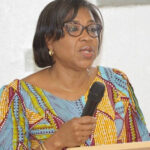With varied concerns from experts on a N10.78 trillion deficit in the N20.51 trillion proposed budget for 2023, rising debt servicing and the plan to redesign the Naira, the Daily Trust Board of Economists (BoE) has called for Public Private partnership (PPP), and debt to revenue ratio measurement model for borrowing.
Rising from its quarterly meeting in Abuja at the weekend, the board also urged the Central Bank of Nigeria (CBN) to deepen its enlightenment of the masses on the gains of redesigning the naira, which includes making more fund available at the banks for improving lending to Small and Medium scale Enterprises (SMEs), among others.
- 5 killed in rival cult clash in Rivers
- NIGERIA DAILY: Why Anambra’s Latest Ban Is Setting Tongues Wagging
According to a communique it issued on Sunday, the Board lauded the performance of the national economy in the second quarter of the 2022 financial year, based on the GDP quarterly report released by the National Bureau of Statistics (NBS), with a GDP growth rate of 3.54%, which is slightly higher than the 3.11% recorded in the first quarter of the year.
The Board, however, noted that the growth trajectory was slow, due in part, to lack of clarity in the policy direction of the government, especially foreign exchange management.
It stated that devoid of key constraints, the key sectors of agriculture, ICTs, SME and manufacturing sectors which are fortunately non-oil sectors, could have performed better. For the oil sector whose growth has been slow, the Board said that could be attributed to oil theft and perhaps the sector could re-bounce with the full commercialization of NNPC Ltd.
Harps on fiscal, monetary coordination by CBN, ministry
Acknowledging the role of CBN in taming the rising inflation, the Board recommended the need to pursue a policy of non-inflationary growth to ensure the GDP growth is beneficial to citizens.
“CBN has an obligation to ensure price stability but the implementation of such policy must be considered with key synchronization of fiscal and trade policies most especially between the CBN and the Federal Ministry of Finance, Budget and National Planning,” it stated.
This, it said, is especially on raising monetary policy rate which may curb inflation but affect borrowing capacity of small businesses and that could also affect their productivity, crowd them out and increase unemployment rate.
Speaking further on this, chairman of the Daily Trust Board of Economists, Prof. Binta Tijjani Jibril said: “One of the major impediments to Nigeria’s economic growth in recent years is the apparent disconnect between the monetary and fiscal authorities. The result of this lack of synergy manifests in accelerated inflation, high rates of interest as well as enormous pressure on the exchange rate.”
Prof. Jibril, a Director of the International Institute of Islamic Banking and Finance at the Bayero University Kano (BUK), also stated that as a matter of urgency government needs to come up with effective coordination mechanisms that would ensure the fulfilment of objectives of each of the two authorities while recognising their different institutional and operational processes.
“This is what will bring about the achievement of sustainable economic growth within the framework of price stability and favourable external accounts,” said Prof. Jibril.
Raising concerns on the 2023 budget proposal, the Board maintained that with a N10.78 trillion deficit from a N20.51trn proposed budget, such proposal is inflation oriented, and the additional debt that needs to be taken to fund it.
“The provisions for capital expenditure may not be met because the capital required to fund it may not be realised. As a result, therefore, there are limited prospects for growth of the economy in the next financial year,” said Dr Rislanudeen Muhammad, a board member, former MD at Unity Bank PLC and CEO at Safmur Investments Ltd.
To overcome this challenge, the Daily Trust BoE advised the federal government to learn from other emerging economies which are adequately financing their infrastructural projects through PPP like the new Lekki Deep Seaport in Lagos financed through partnerships while commending the government on its policy on tax-for-infrastructure swap with major taxpayers such as the Dangote’s Obajana road rehabilitation. It noted, however, that this will only be effective if we put in place a coherent PPP policy.
If the capital expenditure is not met, certain indices that could stimulate economic growth will not be realized, it stated. It also urged the government to scale down on our appetite for borrowing and more fiscal balance by eliminating fuel subsidies and putting in place policies and programmes that protect the weak and vulnerable members of the society.
For the Naira redesign, the Board noted that the policy is quite likely to attract transfer of money from the informal to the formal sector. “However, this is subject to vigorous enlightenment campaigns by the monetary authorities, by sensitising the public about online channels of fund transactions,” stated the communique.
Again, the Board reiterated its deep concern over the obvious lack of coordination between monetary, fiscal and trade policies as well as the rising trend of dollarization of the Nigerian economy which could trigger higher inflation than curb it.
“The government should devise more potent means of tackling money laundering and other illicit transactions, inclusive of full implementation of the extant laws in that respect,” just as the Board pledged its full support to the government to fight it.
To tackle the rising energy costs across the world, the Daily Trust BoE said the full deregulation of the oil sector in Nigeria will help save the country from the persistent funding of fuel subsidy, which is absolutely unsustainable.
It restated its advice to all tiers of government to cut down its appetite for borrowing while embracing PPP. “The government should adopt the use of debt-to-revenue ratio as a measure of debt sustainability rather than debt-to-GDP ratio.”
As the general elections time approaches, the Board noted with concern the expansionary fiscal spending, which could trigger elevated inflation. The Board called for amendments to the Electoral Act to introduce a certain amount to be paid to each political party by its members as a means of raising funds for the parties.
“Without prejudice to the provisions of the Electoral Act, the Board recommended that the security agencies should devise measures to enforce the provisions in terms of election spending,” the communique read.



